|
THE GREENWICH INTERNATIONAL
FESTIVAL OF EARLY MUSIC 2003
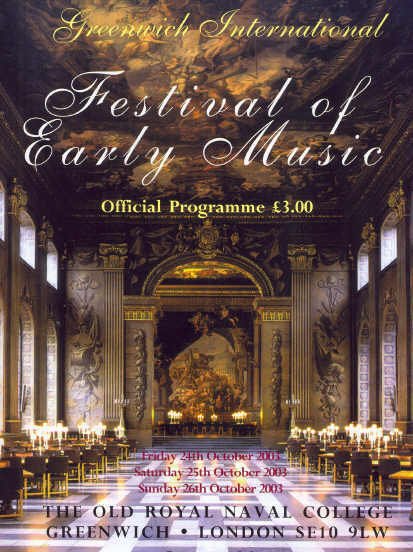 Old Royal Naval College, Greenwich, London 24 - 26 October 2003 Old Royal Naval College, Greenwich, London 24 - 26 October 2003
Trinity College of Music Early Music Ensemble Director Philip Thorby Old Royal Naval College Chapel
Music by Henry Purcell
Welcome to All the Pleasures: A Musical Entertainment From Ode for St Cecilia's Day, 1683
Jehova, quam multi sunt hastes mei (Psalm 3)
A Welcome Song for His Royal Highness at his Return from Scotland in the Year 1682
The Masque from Dioclesian
Rebecca Miles, recorders
Johann Schop
Lachrimae Pavan
Georg Philipp Telemann
Fantasia No 3 in G minor ;
Sonata Methodisch No 3 in G minor
Johann Sebastian Bach
Aria: 'Kein Arzt ist ausser Dir zu' finden' BWV 103;
Sonata VI in C after BWV530
Emma Murphy, recorders
Ryohei Hirose
Meditation for solo alto recorder
Paul Leenhouts
Big Baboon for solo tenor recorder
Maki Ishii
Black Intention for descant recorders, tenor recorder & tam-tam
David Bedford
Piers de Resistance for descant & sopranino recorders
Alexandra Opsahl recorder
with Ian Pritchard (Harpsichord) Henrik Persson (Baroque 'cello and Viola da Gamba) Richard Sweeney, Andrej Jovanic (Theorbos), James OToole, Huw Daniel (Violins), Alfonso Leal del Ojo (Viola) and Sarah Halpin (double bass)
Peter Hannon Dream (1984)
Thomas Preston Upon La Mi Re
Guillaume de Machaut Hont Paour Embellished line from the Codex Faenza
Antonio Bertali Chiacona
Charles Dieupart Suite 2) Allemande, Courante, Sarabande Gavotte, Passepied, Gigue
Antonio Vivaldi Concerto in La Minore per flautino, archi e cembalo
Stephen Preston & Amara Guitry (baroque flutes)
NODNEEYA - a selection of French and German pieces by Devienne, Telemann, Monteclair and Bach, improvisations, and contemporary music by John Thow and John Luther Adams (not the John Adams we all know!).
John Henry, harpsichord & Susan Sheppard, baroque cello
Froberger, Buxtehude, J S Bach and Forqueray
This prime annual event is now established in close association with Trinity College of Music and takes place in a variety of historic and beautiful venues, with major concerts in the Chapel of the Old Royal Naval College, and displays in the glorious Painted Hall opposite.
It is a major event for the Capital and you should diarise it for the same time next year - fuller information on the Festival's website. Many of the 40 or so concerts fill the famous Chapel, visually and acoustically superb, and are heard there by far more people than attend most early music concerts in central London. The Faculty Concert, with students from Trinity’s Early Music Faculty conducted by Philip Thorby, showed how far historically informed practice has penetrated present day training. It was a vastly enjoyable concert ranging over Purcell's finest work for Court, Chapel and Theatre.
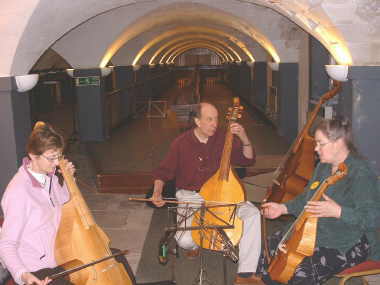 Around 100 instrument makers from around the globe, shops, music publishers, recording companies, societies exhibit, and it is a social gathering which draws enthusiasts from all over the country and abroad, playing informally together by their sales pitches. Early instruments are a delight to the eye as well as to the ear in their loving recreations. Around 100 instrument makers from around the globe, shops, music publishers, recording companies, societies exhibit, and it is a social gathering which draws enthusiasts from all over the country and abroad, playing informally together by their sales pitches. Early instruments are a delight to the eye as well as to the ear in their loving recreations.
There were many harpsichordists to be heard, none more impressive than the blind John Henry, whose easy, relaxed yet virtusosic playing was enhanced by fascinating introductions that placed the composers and works in historical perspectives.
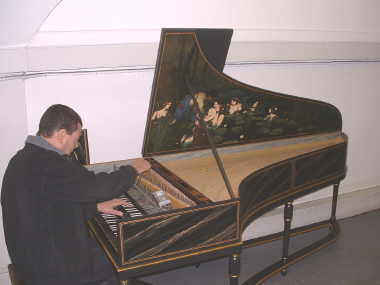
Of the many demonstration recitals I enjoyed particularly the viols made at West Dean College, heard to greatest advantage in the extremely beautiful Admiral President's House.
Photo illustrations:
Colin Booth tuning one of his harpsichords
Richard Jones and his renaissance viols at the skittle alley
Roger Rose with West Dean College viols, demonstrated by Ibrahim Aziz, Alison Crum and colleague
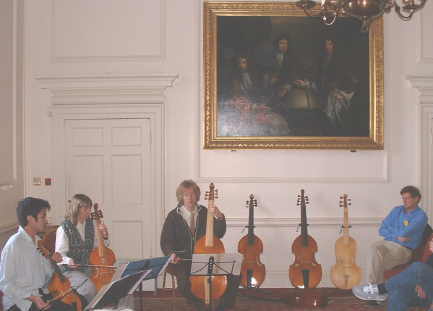
I concentrated this year upon flutes events - recorders and baroque flutes. The standard of recorder playing has developed to a remarkable degree since the pioneering days of Dolmetsch and Franz Bruggen, and we heard three fabulous recitals.
Rebecca Miles, who teaches at Trinity, gave a virtuoso display marked by great sensitivity in phrasing and embellishments, partnered with perfect synchrony and balanceby Alistair Ross on harpsichord. It sounded marvellous in the Chapel, large an auditorium thought that be, as did Emma Murphy in her unaccompanied recital of new music for recorder, which has advanced and now boasts a wide repertoire of innovative music, with many avant-garde pieces from Japan. Her recital demonstrated some of the different styles and techniques used in contemporary recorder music, from jungle sounds and multiphonics to random finger play and two recorders blown simultaneously. It was a captivating selection, with strange sounds which held the attention of small children whose faces were wreathed in smiles, gratifying for the artist when British audiences tend to listen with expressionless faces.
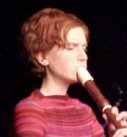 No less impressive was
Alexandra Opsahl in the finals of the Moeck Recorder Competition, which was over-subscribed with an overflow audience in the ante-room to the Peacock Room. Her confidence and presentational flair showed in her winning recital, and in recruiting a small army of supporters to play with her, culminating in a full scale performance of Vivaldi's Concerto in A minor for flautino (recorded by Dan Laurin, one of the adjudicators, on
BIS-CD-865). She will be invited to give a recital next year, and that should not be missed. No less impressive was
Alexandra Opsahl in the finals of the Moeck Recorder Competition, which was over-subscribed with an overflow audience in the ante-room to the Peacock Room. Her confidence and presentational flair showed in her winning recital, and in recruiting a small army of supporters to play with her, culminating in a full scale performance of Vivaldi's Concerto in A minor for flautino (recorded by Dan Laurin, one of the adjudicators, on
BIS-CD-865). She will be invited to give a recital next year, and that should not be missed.
Too few of us made the effort to walk across the several hundred yards to St Alfege Church for an intriguing presentation by baroque flautists
Stephen Preston & Amara Guitry which deserves wider currency.
NODNEEYA is a programme 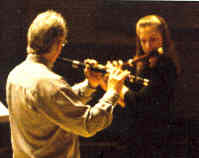 of improvisation, contemporary music and traditional repertoire for these gentle instruments, which can easily be overwhelmed in orchestras. Its theme is dialogue, and its inspiration birdsong. This was another take on Messiaen territory;the flautist couple shared explanatory dialogue and circled around each other whilst improvising courtship ritual; charming, but it would have been enjoyed by far more people across the road in the Trinity campus, and without the not unobtrusive traffic in Greenwich town centre. of improvisation, contemporary music and traditional repertoire for these gentle instruments, which can easily be overwhelmed in orchestras. Its theme is dialogue, and its inspiration birdsong. This was another take on Messiaen territory;the flautist couple shared explanatory dialogue and circled around each other whilst improvising courtship ritual; charming, but it would have been enjoyed by far more people across the road in the Trinity campus, and without the not unobtrusive traffic in Greenwich town centre.
I am pleased to append below my report of the first of these weekends held at Greenwich last year:
|
|
Early Music Network Showcase/
London International Exhibition of Early Music
25-27 October 2002
"Performances on modern string and wind instruments, and on the ubiquitous Steinway grand, will soon come to seem anachronistic and belonging 'historically' to the twentieth century." Says Peter Grahame Woolf.
Passacaglia (recorders, harpsichord, viola da gamba) with Dan Laurin (recorders). Works by Boismortier, Peter McGarr etc
25 October, St. Alfege's Church
I Fagiolini : music by Monteverdi,Gesualdo, Byrd and Tomkins. English Cornett and Sackbut Ensemble : music from the time of Claudio Monteverdi. Chapelle du Roi : Sacred music of the late Medieval and Renaissance periods. 26 October, Chapel, Old Royal Naval College.
Many concerts in the Painted Hall and the Peacock Room of the College building.
Sir Charles Mackerras, President of Trinity College of Music, opened the Early Music Weekend 2002 in the magnificent Painted Hall, with its trompe d'oeuil decorations by Thornhill, to celebrate Trinity College of Music's auspicious new home at the Old Royal Naval College, Greenwich. Trinity has declared a far-reaching commitment to establish the College as a major centre for the study and performance of early music and period-instrument practice - indeed, this was one of the determining factors in its choosing to relocate to this extraordinary site, with a musical tradition extending back to the Court of Henry VIII.
The Weekend included the annual London International Exhibition of Early Music, which involves makers of harpsichords, crumhorns, lutes, baroque violins, early woodwind and string instruments, as well as publishers and other specialists. The Early Music Network Showcase featured a concert programme of established professional artists and ensembles, together with up-and-coming talent of highest achievement and promise. For the first time the UK's two major international Early Music events have come together, and in 'the perfect venue'. It was both a market and a festival.
There were so many performances, formal and more spontaneous, that overlap was inevitable and no one could hear everything. St Alfege's Church, where Thomas Tallis is buried, hosted some of the Weekend's concerts, including the first, by Passacaglia, with the recorder virtuoso Dan Laurin (he has many BIS CDs); a concert that set a standard nowhere superseded. I was unable to stay for the second half.
Apollo & Pan is a trio which demonstrated how well renaissance violin (Tassilo Erhardt) and dulcian (Sally Holman, old bassoon) go together; Steven Devine accompanied on chamber organ in the Peacock Room, the College's attractive small auditorium with fine acoustics, one which many concert promoters might be jealous of and should consider hiring. Amnis, who featured music by residents of cosmopolitan London in the baroque period, Matteis, Purcell, Geminiani and Handel, is a name to memorise.
Most spectacular of all was I Fagiolini, who specialise in Italian renaissance music. The group had two Showcase 'spots' on the Saturday, a morning selection of The Music of Theatre, their staged productions with masks, aimed to make Venetian madrigal comedies by Bianchieri & Vecchi accessible to modern audiences. Even for Italians, the Venetian dialect of the time is unintelligible, so our pleasure was enhanced by witty, scurrilous introductions written by Timothy Knapman. Developed over four years, this is a brilliant, completely original show, which should be captured on DVD. In the evening, I Fagiolini gave a mixed programme, including a Tomkins item from their latest Chandos CD and ending with Woa Lashona, a song 'for the end of a long day', from Soweto! But the programming was so clever that they returned immediately to join the next group for Deus in Auditorium from the Vespers 1610, the first item in the English Cornett and Sackbut Ensemble's programme of Italian music from the time of Monteverdi. The cornetts and sackbuts went on to amaze with their smooth mastery of fickle instruments, Fiona Russell on a special ivory cornett unforgettable.
Joglaresa, led by Belinda Sykes, impressed with their dash and flair in Hebrew/Arabic/Spanish medieval repertoire, given in the Chapel. Not every group had such a well-developed manner of presentation to 'get across' to a large audience - some played viols more for themselves, and there were singers who maintained pure tone but with limited projection. Of the more senior and well established performers, Catherine Bott described the early music movement as combining scholarship with passion, and demonstrated this in spades in her magnificent recital with David Owen Norris.
So did bass-baritone Stephen Varcoe, who brought the main concerts to an end with later 'early music' (Pinto, Zelter & Schubert), Peter Seymour playing a superlative copy by Johannes-Secker of a Stein fortepiano, which is to stay at the College. Trinity's good fortune was demonstrated by Carole Cerasi with Pavlo Besnosiuk in violin sonata movements by Pinto and Beethoven (Op.30/3) which left you not wanting to hear a Steinway in such repertoire for a long time.
The Sunday morning ended with unintended drama - a storm which blew scaffold poles off the top of the Chapel, causing hasty evacuation of the building and cancellation of a lunchtime reception for the international delegates, who had to repair to the nearby hostelry for lunch instead, whilst relocations were organised for the afternoon!
Afterwards one was left to reflect on a rich experience, and admiration for all these dedicated creators, musicians and instrument makers, who have succeeded in bringing us ever closer to music of bygone ages. Performances on modern string and wind instruments, and on the ubiquitous Steinway grand, will soon come to seem anachronistic and belonging 'historically' to the twentieth century. Likewise the heavy vibrato - standard until recently for singers (my mother taught herself to 'wobble' in front of a mirror) - and refreshingly absent throughout this memorable weekend.
Concert clashes were inevitable this first time, because part of the weekend was on behalf of the Early Music Network Showcase, and the other part on behalf of the London International Exhibition of Early Music. Everyone was in a new venue (plus St Alfege Church), so cross-communication was not easy. It is intended that the annual Exhibition (the instrument-makers and their workshop recitals) happens in the same venue in the (same) Autumn half-term weekend. Make a note to check up with Trinity College of Music for details of the Early Music Weekend 2003. |
|



